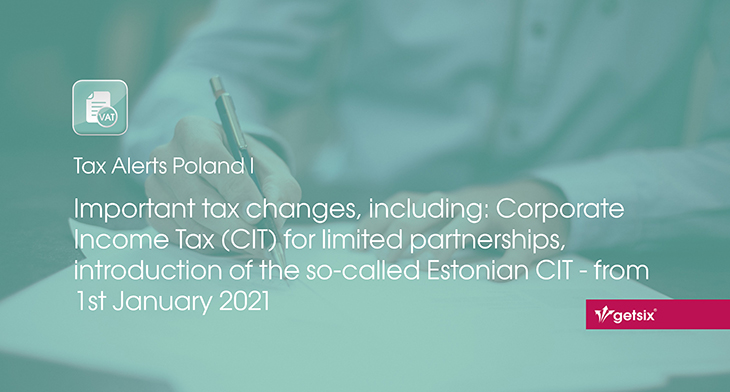Important tax changes: Corporate Income Tax
The Polish President has signed two amendments to income tax laws adopted by the Sejm, which provide, amongst others, for the CIT treatment of limited partnerships and introduction of the so-called Estonian CIT.
The amendments will enter into force on 1st January 2021.
Important: The new taxation laws for limited partnerships will come into force on 1st May 2021. In this case, the company may extend its fiscal year and close its books only on 30th April 2021.
Below getsix® present the main assumptions of the introduced changes resulting from the change in the laws:
- Amendment of the CIT law and certain other laws;
- Amendments to the Personal Income Tax (PIT) law, the CIT law, the Lump-Sum/Flat Rate Income Tax on Certain Incomes Earned by Certain Individuals’ and certain other laws.
The most important changes introduced by the law include:
The law provides for two alternative solutions, i.e., a lump-sum/flat rate taxation on the income of capital companies (so-called Estonian CIT) and a special investment fund, enabling faster settlement of fixed asset depreciation.
A capital company in which only natural persons are shareholders may be subject to lump-sum/flat rate taxation on the income of capital companies. In addition, the income of such a company may not exceed the threshold 100 million PLN, and the company must employ, on the basis of an employment contract, at least 3 people who are not shareholders of the company. The essence of this solution is to postpone the collection of tax until the moment of payment of profits from the company.
Covering the scope of the CIT law of limited partnerships having their seat or management board in the territory of the Republic of Poland and general partnerships having their seat or management board in the territory of the Republic of Poland, if the partners of the general partnership are not exclusively natural persons and the partnership fails to fulfil its information obligations:
The income generated by the company will be applied:
- Tax rate of 9% – if the annual income generated by the company does not exceed EUR 2 million;
- Tax rate of 19% – in other cases.
Taxation of general partners
As a rule, the profit paid to the general partner will be subject to a lump-sum/flat rate income tax of 19%. However, the general partner will be able to reduce their tax due by a pat of the CIT paid by the limited partnership in accordance with its share in the profit of the limited partnership. This ensures that their tax burden will continue to be compared to that of partners of tax-transparent companies (which are not CIT taxpayers).
Exemption for limited partners
An exemption of 50% of the revenue obtained by the limited partner is provided for limited partners, but not more than 60,000.00 PLN per year. However, for a limited partner to benefit from the exemption, a limited partner must meet a number of conditions. In particular, the application of the exemption excludes:
- holding, directly or indirectly, at least 5% of shares in a company having legal personality or a capital company in an organisation which is a general partner in a limited partnership from which the limited partner’s income subject to the exemption comes,
- being a member of the management board of a general partner of a limited partnership from which the income of a limited partner subject to exemption comes, or of a company holding directly or indirectly at least 5% of shares in a company which is a general partner of a limited partnership from which the income of a limited partner subject to exemption comes,
- Being an entity related to a partner or member of the management board of the companies described above in accordance with the rules set out in the law.
Taxpayers will still be able to deduct the amount of the relief from income tax, but not exceeding 1360.00 PLN.
Increase of the revenue limit for CIT taxpayers to apply a 9% tax rate from EUR 1.2 million to EUR 2 million.
Increase of the revenue limit determining the possibility of taking advantage of the lump sum on recorded revenue (from EUR 250,000.00 to EUR 2 million).
- Extension of the scope of people entitled to benefit from lump-sum/flat rate income tax and modification of the lump-sum amount on recorded income;
- Introduction of a definition of a real estate company into the tax law system and establishment of special provisions concerning taxation of these companies and submission of additional information, as well as an obligation to appoint a tax representative for real estate companies not having their registered office or management in the territory of Poland;
- Expanding the catalogue of entities obliged to prepare local transfer pricing documentation;
- Extending the scope of content of local transfer pricing documentation concerning transactions with entities from so-called tax havens to include economic justification;
- Limiting the application of the provisions on increasing and decreasing depreciation rates to fixed assets used for tax-exempt activities;
- An obligation for certain entities to draw up and make public information on their tax strategy;
- Extension of the tax preferences that were introduced into the legal system due to the COVID-19 pandemic.
If you have any additional questions about tax or require further information, please contact your relevant contact person who will forward your enquiry to the department:
Tax & Legal of the getsix Group
Our specialist tax advisors, headed by Mrs. Aneta, are at your disposal. You will find the contact form on the getsix website.

Your getsix® Team
***














